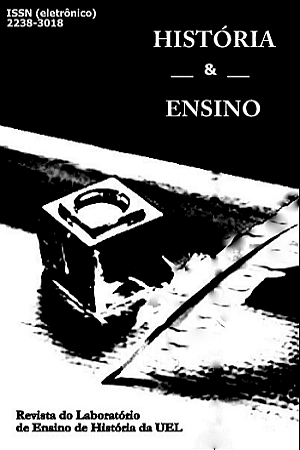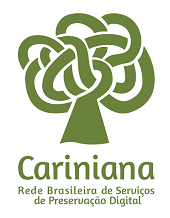Historical situated cognition and the evaluation criteria of textbooks in Brazil
DOI:
https://doi.org/10.5433/2238-3018.2018v24n2p29Keywords:
Evaluation, Historical consciousness, Historical learning, High School.Abstract
This investigation covers the qualitative analysis of the evaluation criteria of History textbooks in High School, proposed by the Brazilian government in the document Public Notice PNLD 2015 for 2018. We have adopted the methodology of qualitative investigation of study in the case and some elements from content analysis in the bibliographical and documental research. The fundamental question that has guided the route of this investigation was to verify if, among the evaluation criteria of Brazilian textbooks, elements related to the learning process whose nature is based on "historical situated cognition" have been incorporated. In order to define the empirical range of our investigation, we have selected for analysis the criteria used in the evaluation process of History textbooks dedicated to High School students, whose age range is between 15 to 17 years old. The data categorization was performed through those proposed for the field of Human Sciences and also, more specifically, for History. The categories were selected guided by the theoretical frame we have selected and can be summarized in: 1: Temporal orientation; 2. Multiperspectivity; 3. Work with sources. We have observed that the conception gap of what "historical thought" is, as well as the criteria adopted, indicate more a concern with methodological and conceptual aspects from the field of Human Sciences than a more explicit criteria delimitation that could set boundaries to a didactic work, whose objective would be to learn how to think historically. It is believed that the explanation of the criteria that form historical though could qualify, in a more objective way, the learning process and, therefore, the History teaching, towards a historical literacy, that would put the young High School student as a citizen from the world and from his time.Downloads
Download data is not yet available.
References
ASHBY, Rosalyn. (2003). Conceito de Evidência Histórica: exigências curriculares e concepções de alunos. In I. Barca (Org.) Educação Histórica e Museus. Actas das 2as. Jornadas Internacionais de Educação Histórica. Braga: Uminho. Instituto de Educação e Psicologia.
ASHBY, Rosalyn. (2006). Desenvolvendo um conceito de evidência histórica: as ideias dos estudantes sobre testar afirmações factuais simples. Educar em Revista. Dossiê Educação Histórica, (pp. 151-170). Curitiba: Editora da UFPR.
BARCA, Isabel. (2006). Literacia e consciência histórica. Educar em Revista. Dossiê Educação Histórica, (pp. 93-112). Curitiba: Editora da UFPR. Brasil/MEC/FNDE.(2015). Edital de Convocação PNLD 2015 para 2018. Recuperado em 14 dezembro, 2017, de http://www.fnde.gov.br/programas/programas-do-livro/consultas/editaisprogramas-livro/item/7932-pnld-2018. Acesso em 14/dez./2017.
CARIE, Nayara Silva de. (2008). Avaliações de coleções didáticas de História de 5ª a 8ª série do ensino fundamental: um contraste entre os critérios avaliativos dos professores e do Programa Nacional do Livro Didático. Dissertação de Mestrado, Educação, Universidade Federal de Minas Gerais, Belo Horizonte, MG, Brasil.
COOPER, Hilary. (2006). Aprendendo e ensinando sobre o passado a crianças de três a oito anos. Educar em Revista. Dossiê Educação Histórica, (pp. 171-190). Curitiba: Editora da UFPR.
IDRISSI, Mostafa Hassani. (2005). Pensée historienne et apprentissage de l'histoire. Paris: L'Harmattan. KUENZER, Acácia. (2000). Ensino médio: novos desafios. In Kuenzer, A. (Org.). Ensino Médio. Construindo uma proposta para os que vivem do trabalho. São Paulo: Cortez.
LEE, Peter. (2011, out-dez.). Por que aprender História? Educar em Revista. Dossiê: História, epistemologia e ensino: desafios de um diálogo em tempos de incertezas, (N. 42, pp.19-42). Curitiba: Editora da UFPR.
LESSARD-HÉBERT, M., GOYETTE, G., & BOUTIN, G. (1994). Investigação qualitativa. Fundamentos e Práticas. Lisboa: Instituto Jean Piaget.
MIRANDA, Sonia Regina, & LUCA, Tania Regina de. (2004). O livro didático de história hoje: um panorama a partir do PNLD. Revista Brasileira de História, 24(48), 123-144. https://dx.doi.org/10.1590/S0102- 01882004000200006
RÃœSEN, Jörn. (2010). O livro didático ideal. In Schmidt, M.A., Barca, I., & Martins, E.R.. Jörn Rüsen e o ensino de história. Curitiba: Editora da UFPR; Braga (PT): Uminho.
RÃœSEN, Jörn. (2012). Aprendizagem Histórica. Fundamentos e paradigmas. Curitiba: W & A Editores.
RÃœSEN, Jörn. (2014). Tiempo en ruptura. Mexico, D.F.: Universidad Autónoma Metropolitana/Azcapotzalco.
SCHMIDT, Maria Auxiliadora. (2009). Cognição histórica situada: que aprendizagem histórica é esta? In Schmidt, M.A. & Barca, I. Aprender História: Perspectivas da Educação Histórica. Ijuí: Editora UNIJUI.
SCHMIDT, Maria Auxiliadora & GARCIA, Tânia Braga. (2010). The Public Usage of History in Brazil and its Relationships With Governmental Policies and Programs. In Nakou, I. & Barca, I. Contemporary Public Debates Over History Education. Charlotte, North Carolina: IAP Information Age Publishing Inc.
SIMÃO, Ana Catarina Gomes Lage Ladeira. (2007). A construção da evidência histórica: concepções de alunos do 3.º ciclo do ensino básico. Tese de doutorado, Instituto de Educação e Psicologia, Universidade do Minho, Braga-PT. http://hdl.handle.net/1822/7116
STAMATTO, Maria Inês Sucupira, & CAIMI, Flavia Eloisa. (2016, maio-ago.). O livro didático do Ensino Médio: critérios de avaliação e documentos curriculares. Revista Educação em Questão, (Vol.54, N.41, pp.220-250).
ASHBY, Rosalyn. (2006). Desenvolvendo um conceito de evidência histórica: as ideias dos estudantes sobre testar afirmações factuais simples. Educar em Revista. Dossiê Educação Histórica, (pp. 151-170). Curitiba: Editora da UFPR.
BARCA, Isabel. (2006). Literacia e consciência histórica. Educar em Revista. Dossiê Educação Histórica, (pp. 93-112). Curitiba: Editora da UFPR. Brasil/MEC/FNDE.(2015). Edital de Convocação PNLD 2015 para 2018. Recuperado em 14 dezembro, 2017, de http://www.fnde.gov.br/programas/programas-do-livro/consultas/editaisprogramas-livro/item/7932-pnld-2018. Acesso em 14/dez./2017.
CARIE, Nayara Silva de. (2008). Avaliações de coleções didáticas de História de 5ª a 8ª série do ensino fundamental: um contraste entre os critérios avaliativos dos professores e do Programa Nacional do Livro Didático. Dissertação de Mestrado, Educação, Universidade Federal de Minas Gerais, Belo Horizonte, MG, Brasil.
COOPER, Hilary. (2006). Aprendendo e ensinando sobre o passado a crianças de três a oito anos. Educar em Revista. Dossiê Educação Histórica, (pp. 171-190). Curitiba: Editora da UFPR.
IDRISSI, Mostafa Hassani. (2005). Pensée historienne et apprentissage de l'histoire. Paris: L'Harmattan. KUENZER, Acácia. (2000). Ensino médio: novos desafios. In Kuenzer, A. (Org.). Ensino Médio. Construindo uma proposta para os que vivem do trabalho. São Paulo: Cortez.
LEE, Peter. (2011, out-dez.). Por que aprender História? Educar em Revista. Dossiê: História, epistemologia e ensino: desafios de um diálogo em tempos de incertezas, (N. 42, pp.19-42). Curitiba: Editora da UFPR.
LESSARD-HÉBERT, M., GOYETTE, G., & BOUTIN, G. (1994). Investigação qualitativa. Fundamentos e Práticas. Lisboa: Instituto Jean Piaget.
MIRANDA, Sonia Regina, & LUCA, Tania Regina de. (2004). O livro didático de história hoje: um panorama a partir do PNLD. Revista Brasileira de História, 24(48), 123-144. https://dx.doi.org/10.1590/S0102- 01882004000200006
RÃœSEN, Jörn. (2010). O livro didático ideal. In Schmidt, M.A., Barca, I., & Martins, E.R.. Jörn Rüsen e o ensino de história. Curitiba: Editora da UFPR; Braga (PT): Uminho.
RÃœSEN, Jörn. (2012). Aprendizagem Histórica. Fundamentos e paradigmas. Curitiba: W & A Editores.
RÃœSEN, Jörn. (2014). Tiempo en ruptura. Mexico, D.F.: Universidad Autónoma Metropolitana/Azcapotzalco.
SCHMIDT, Maria Auxiliadora. (2009). Cognição histórica situada: que aprendizagem histórica é esta? In Schmidt, M.A. & Barca, I. Aprender História: Perspectivas da Educação Histórica. Ijuí: Editora UNIJUI.
SCHMIDT, Maria Auxiliadora & GARCIA, Tânia Braga. (2010). The Public Usage of History in Brazil and its Relationships With Governmental Policies and Programs. In Nakou, I. & Barca, I. Contemporary Public Debates Over History Education. Charlotte, North Carolina: IAP Information Age Publishing Inc.
SIMÃO, Ana Catarina Gomes Lage Ladeira. (2007). A construção da evidência histórica: concepções de alunos do 3.º ciclo do ensino básico. Tese de doutorado, Instituto de Educação e Psicologia, Universidade do Minho, Braga-PT. http://hdl.handle.net/1822/7116
STAMATTO, Maria Inês Sucupira, & CAIMI, Flavia Eloisa. (2016, maio-ago.). O livro didático do Ensino Médio: critérios de avaliação e documentos curriculares. Revista Educação em Questão, (Vol.54, N.41, pp.220-250).
Downloads
Published
2018-12-31
How to Cite
Schmidt, M. A. (2018). Historical situated cognition and the evaluation criteria of textbooks in Brazil. História & Ensino, 24(2), 29–53. https://doi.org/10.5433/2238-3018.2018v24n2p29
Issue
Section
Autor(a) Convidado(a)
License
Copyright (c) 2019 História & Ensino

This work is licensed under a Creative Commons Attribution 4.0 International License.
História & Ensino adota a licença CC-BY esta licença permite que os reutilizadores distribuam, remixem, adaptem e criem a partir do material em qualquer meio ou formato, desde que a atribuição seja dada ao criador. A licença permite o uso comercial.























